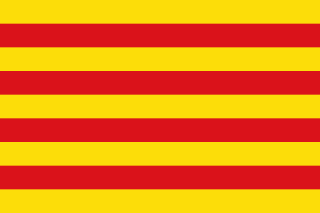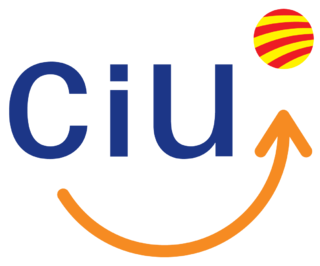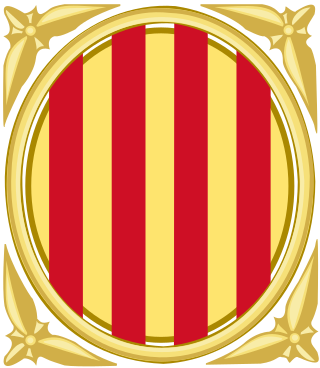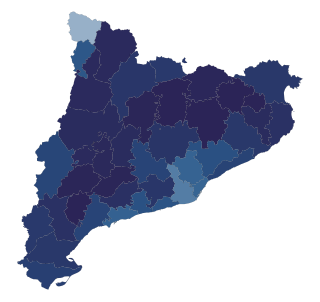This article lists political parties in Catalonia represented in Parliament, their ideologies, leaders, number of MPs and their positions on Catalan independence.

Catalonia is an autonomous community of Spain, designated as a nationality by its Statute of Autonomy. Most of its territory lies on the northeast of the Iberian Peninsula, to the south of the Pyrenees mountain range. Catalonia is administratively divided into four provinces or eight regions, which are in turn divided into 42 comarques. The capital and largest city, Barcelona, is the second-most populated municipality in Spain and the fifth-most populous urban area in the European Union.
The Generalitat de Catalunya, or the Government of Catalonia, is the institutional system by which Catalonia politically organizes its self-government as an autonomous community of Spain. It is formed by the Parliament of Catalonia, the Presidency of the Generalitat de Catalunya, and the Executive Council of Catalonia. It is ruled according to the Statute of Autonomy of Catalonia.

The Catalan Countries are those territories where the Catalan language is spoken. They include the Spanish regions of Catalonia, the Balearic Islands, Valencian Community, and parts of Aragon and Murcia (Carche), as well as the Principality of Andorra, the department of Pyrénées-Orientales in France, and the city of Alghero in Sardinia (Italy). It is often used as a sociolinguistic term to describe the cultural-linguistic area where Catalan is spoken. In the context of Catalan nationalism, the term is sometimes used in a more restricted way to refer to just Catalonia, Valencia and the Balearic Islands. The Catalan Countries do not correspond to any present or past political or administrative unit, though most of the area belonged to the Crown of Aragon in the Middle Ages. Parts of Valencia (Spanish) and Catalonia (Occitan) are not Catalan-speaking.
The Republican Left of Catalonia is a pro-Catalan independence, social-democratic political party in the Spanish autonomous community of Catalonia, with a presence also in Valencia, the Balearic Islands and the French department of Pyrénées-Orientales. It is also the main sponsor of the independence movement from France and Spain in the territories known as Catalan Countries, focusing in recent years on the creation of a Catalan Republic in Catalonia proper. Its current president is Oriol Junqueras and its secretary-general is Marta Rovira. The party is a member of the European Free Alliance.

Catalan nationalism is the ideology asserting that the Catalans are a distinct nation. A related term is Catalanism, which tends to have a wider meaning, as some people define themselves as Catalanist but not Catalan nationalist.

Convergence and Union was a Catalan nationalist electoral alliance in Catalonia, Spain. It was a federation of two constituent parties, the larger Democratic Convergence of Catalonia (CDC) and its smaller counterpart, the Democratic Union of Catalonia (UDC). It was dissolved on 18 June 2015.

The Democratic Convergence of Catalonia, frequently shortened as Convergence was a Catalan nationalist, liberal political party in Catalonia (Spain), currently still existing without any political activity.

United and Alternative Left is a political party in Catalonia, Spain. EUiA has 4000 members, and until 2019 was the Catalan correspondent of the Spain-wide United Left (IU).

The Socialists' Party of Catalonia is a social-democratic political party in Catalonia, Spain, resulting from the merger of three parties: the Socialist Party of Catalonia–Regrouping, led by Josep Pallach i Carolà, the Socialist Party of Catalonia–Congress, and the Catalan Federation of the PSOE. It is the Catalan instance of the Spanish Socialist Workers' Party (PSOE), and its Aranese section is Unity of Aran. The party had also been allied with federalist and republican political platform Citizens for Change until the 2010 election. PSC–PSOE has its power base in the Barcelona metropolitan area and the comarques of Tarragonès, Montsià, and Val d'Aran.

Artur Mas i Gavarró is a Catalan politician. He was president of the Government of Catalonia from 2010 to 2015 and acting president from September 2015 to 12 January 2016.

The Unified Socialist Party of Catalonia was a communist political party active in Catalonia between 1936 and 1997. It was the Catalan branch of the Communist Party of Spain and the only party not from a sovereign state to be a full member of the Third International.

The Catalan independence movement is a social and political movement which seeks the independence of Catalonia from Spain.
The politics of Catalonia takes place within the framework of its Statute of Autonomy, which grants a degree of self-government to Catalonia and establish it as an autonomous community of Spain with the status of a nationality, operating as a parliamentary democracy. The Generalitat de Catalunya is the Catalan institution of self-government, which includes the Parliament of Catalonia, the President and the Executive Council. The Parliament of Catalonia is one of the oldest in the world.

Northern Catalonia, North Catalonia or French Catalonia is the formerly Catalan-speaking and cultural territory ceded to France by Spain through the signing of the Treaty of the Pyrenees in 1659 in exchange of France's effective renunciation on the formal protection that it had given to the recently founded Catalan Republic. The area corresponds roughly to the modern French département of the Pyrénées-Orientales which were historically part of Catalonia since the old County of Barcelona, and lasted during the times of the Crown of Aragon and the Principality of Catalonia until they were given to France by Spain.

The Parliament of Catalonia is the unicameral legislature of the autonomous community of Catalonia. The Parliament is currently made up of 135 members, known as deputies, who are elected for four-year terms or after extraordinary dissolution, chosen by universal suffrage in lists of four constituencies, corresponding to the Catalan provinces. The Parliament building is located in Ciutadella Park, Barcelona.

The Popular Unity Candidacy is a left-wing to far-left pro-Catalan independence political party active primarily in Catalonia, where it has political representation, but also in other autonomous communities in Spain it considers to be part of the Catalan Countries. The CUP traditionally has focused on municipal politics, and is made up of a series of autonomous candidatures that run in local elections. Its presence is strongest within the borders of Catalonia.

The president of the Government of Catalonia is head of government of Catalonia, leading the executive branch of the Generalitat de Catalunya, the Catalan government.
Catalan Solidarity for Independence is an electoral coalition in Catalonia, founded in the summer of 2010 as an outcome of the grassroots social movement that initiated and organized the Catalan independence referendums of 2009 and 2010. It was organized as a common political platform for Catalan independentism, dissatisfied with what they considered a pragmatist and conformist policy of other Catalan parties towards the issue of independence.
The Statute of Autonomy of Catalonia of 2006 provides Catalonia's basic institutional regulations under the Spanish Constitution of 1978. It defines the rights and obligations of the citizens of Catalonia, the political institutions of the Catalan community, their competences and relations with the rest of Spain, and the financing of the Government of Catalonia.

A non-binding Catalan self-determination referendum, also known as the Citizen Participation Process on the Political Future of Catalonia, was held on Sunday, 9 November 2014, to gauge support on the political future of Catalonia. While also referred to as "Catalan independence referendum", the vote was rebranded as a "participation process" by the Government of Catalonia, after a "non-referendum popular consultation" on the same topic and for the same date had been suspended by the Constitutional Court of Spain.